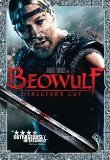|
Beowulf directed by Robert Zemeckis (Paramount, 2007) Animation may someday replace actors entirely on film. But that day hasn't yet arrived. Beowulf, filmed from a screenplay by Neil Gaiman and Roger Avary and based on the classic epic poem that has plagued literature students for generations, employs a top-tier cast for motion and speech, but the figures you see on the screen are 100 percent computer-generated. And it's amazing, truly, just how real those characters seem at some points in the film. At times I would almost swear I was seeing flesh-and-blood actors at work. But not always. There are as many times when I felt more like I was watching a scene from a high-end video game. Facial expressions, particularly while speaking, were often off just enough to dispel my sense of reality.
Actor Ray Winstone, buffed and polished by computer magic, is the mighty Geat warrior who comes crashing out of a stormy sea to wrest glory from the ruins of Hrothgar's famous mead hall. As Beowulf, he is vainglorious and boastful, electric with the power of his own mythology -- and yet it must be conceded that his reknown was fairly earned with great deeds in the past. His enemy here is the grotesque Grendel, drooling and repugnant, showing as much of his insides as his out. Grendel's appearance in the story marks the beginning of some extreme scenes of violence, sudden and brutal -- not the clean cut of sharp swords but the tearing of limbs and breaking of bones by a creature both mad and mighty. There is blood and, oh yes, there is gore. But, despite Beowulf's fierce battle with Grendel and, much later, his conflict with a marauding dragon, this movie is not just a brawny action flick. It is in its way a tragedy about the death of character, when myths outgrow the men who inspired them and heroes cease to be heroes in their own minds. It is telling, and moving, when Beowulf asks his queen to remember him, not as a king or hero, but as "a man, fallible and flawed." Winstone infuses Beowulf with bluff nobility. Anthony Hopkins' Hrothgar, the aging king, is a jolly drunk when he isn't remembering his own secret shame. As Wealthow, Hrothgar's wife and then Beowulf's, Robin Wright Penn is pensive and cold. The thane Unferth is portrayed by a sneering John Malkovich, while Brendan Gleeson is the crotchety but steadfast Wiglaf. Angelina Jolie's first appearance as Grendel's mother -- rising from the water in little but liquid gold -- is a "wow" moment in the film (at least until you catch a glimpse of her inexplicable high heels). Every bit as sensual as Grendel was horrid, Jolie makes the monster's mother into a creature of an entirely different sort -- far more pleasurable, and far more dangerous, too. It is an interesting tool of this sort of computer animation that, for instance, Jolie could appear almost entirely nude without realizing it when she made the film. On the other hand, the movie supplied me with far more of Hopkins, or at least his sheet-clad doppleganger, than I wanted to see. As for Winstone, he escaped complete exposure only because of the artful placement of a sword or helmet here, a cloud of steam there, in a series of camera angles that speak more of Austin Powers than a great epic. It was a laughably silly conceit that yanked me right out of the moment and added awkward hilarity to an otherwise tense scene. Still, the movie rises above its weaknesses to present a powerful new interpretation of the tale, an epic as it surely must have existed in the imaginations of the Danes and Saxons who grew up with the story. I can recommend Beowulf because it was never meant to seem real.  |

Rambles.NET review by Tom Knapp 22 December 2007 





|

